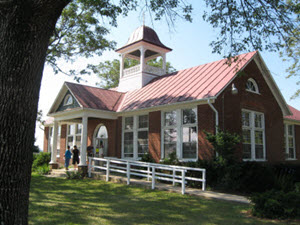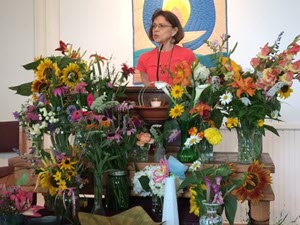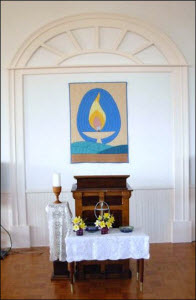
HUU Sermon Archives
Spirituality and the Cinema: Working Script Outline
Written and Starring Eric La; Directed and Narrated by Lynn Lo.
With Special Musical Guest Charlotte!
August 31, 2003
Featuring the Congregation as Themselves
And Nevin Zehr as the Chaplain
Scene One/Take One
Fade In/Interior HUU/ Sunday Morning/August 31, 2003
Music Plays....... Bells are heard tolling in the background
Narrator: Welcome to HUU......
Narrator and/or Congregation: Preview of Upcoming Attractions
Eric: (Ad Lib explanation about these three blank lines)
__________________________
__________________________
__________________________
Musical #1 "Good Morning Starshine" From the movie musical Hair.
Narrator: Lights, Camera, Action! (Narrator lights Chalice)
Responsive Reading: From Monty Python's Meaning of Life
Comedy and Tragedy:
Various Members of the congregation ad lib from front while lighting additional candles
Musical #2 "Climb Every Mountain" from the movie musical The Sound of Music.
Scene Two/Take One
From the movie Dogma by Kevin Smith
Interior Airport/Daytime/Present Day
Characters:
Loki and Bartleby - 2 Fallen Angels
A Nun
Show Me the Money!
Dialogue and Structured Improvisation with Eric
Benediction
Eric's Talk
Firstly, I wish our minister byrd tetzlaff could be here. she's a huge movie fan. SO huge a movie fan that we can be sure she's here in here in spirit, if not in person . . . .
Recently, members of our congregation have been meeting for an HUU movie night. (Merle Wenger has graciously let us meet in his home).
Also recently, a group of mostly younger people associated with our congregation has met here at the church to discuss spiritual themes found in current, popular movies.
As participants in a centuries-old liberal religious tradition, we seem to take it for granted that spirituality and the movies can overlap.
During this service we're going to examine how and why this is so, first in a very general way, and then -- as much as time allows -- in a more specific fashion.
in the 3rd century, Tertullian asked the famous question: "what does Athens have to do with Jerusalem?"
that a learned church father was unable to fathom christianity's indebtedness to pagan idealism (and esp. plato) is not our concern.
BUT we are here to ponder a question similar to -- and perhaps more difficult than -- the one posed by tertullian : what does Hollywood have to do with Jerusalem?
put more bluntly: what do movies have to do with spirituality?
is there, beyond the much-balyhooed and bemoaned hollywood babylon, a cinema of the sacred?
of course, not all films are made in Hollywood, -- thank goodness -- but ALL movies are by their very nature SENSUAL. the phrase "the theatre of the senses" is, after all, a redundancy. a history of film must commence : "in the beginning, there was the image."
sound came later, and many including those in the industry thought sound unnecessary or distracting. some even fought the introduction of sound.
film's synonymity with the image is crucial here. in our left-brain, patriarchal culture, "spirituality" connotes belief in "the word," the sacred, written text, eternal black-and-white. this is part of our ancient, conservative Judaic heritage. ironically, modern liberal Jews have been instrumental in the resurrection of the image, in the production and popularization of film.
now, for many traditionally religious folk, the experience of the image smacks of pagan idolatry, and evokes the prohibition embodied in the first commandment -- ideally, a jealous god tolerates no iconic distractions from his divine word and wraith-like majesty. only an abstract image -- say a statue of the ten commandments -- can safely make it past the overbearing superego, the internalized all-father, the inner censor of the religious conservative.
the flickering silver screen image is simply too mercurial, too protean -- it is forever morphing. this is a red flag to those for whom it is an article of faith that spiritual truths can best -- or ONLY -- be embodied in eternally unchanging platonic forms, or illustrated in words carved in stone, certainly not in a fluid painting or tapestry -- a "motion picture."
yes, it's true -- traditionally, when people think of spirituality, they think of -- traditional religion!
But spirituality can be broadly (that is to say, liberally) defined as: "the quest for meaning," and does not necessarily have to do with traditional religious forms.
the quest for meaning is, so far as we know, a uniquely human endeavor.
why bother with "meaning"?
because the universe as it presents itself to our senses appears at once ordered and chaotic, beautiful and terrifying, but so far as meaning goes, it is deaf dumb and blind. for example, we observe that nature is red in tooth and claw, and fate all too often random and impersonal. the cosmos simply IS. it does not tell us WHY.
for us humans -- self-aware entities, who have, for example, developed a concept of time, and are keenly aware of our own mortality -- this state of affairs is intolerable. hence, the quest for meaning is our fate by nature -- it is what makes us human. the quest for meaning marks us, as surely as cain was marked.
what does that mean -- "quest"? so far as the human quest for meaning is concerned, it is more than mere discovery -- it is creation!
Nietzsche said: "we are all greater artists than we realize," and by this he meant that we are constantly creating meaning, or we are appropriating meaning created by others, often by default, even if we are unaware we are doing so.
the history and prehistory of humanity's quest for meaning, can be traced through the millennia in art, which is meaning that has been distilled and concretized, and can be experienced.
there are art forms that stay static on cave walls, on pottery, tapestries, and on wood and canvas
and there are art forms that are dynamic, ephemeral: the shaman's song and dance, the poet's rhythmic words and phrases, and the music and motion of the opera
motion pictures are modern humanity's crowning achievement in the art of the dynamic image, accompanied by sound. once a movie is produced, it may be replicated, and viewed by people across the world, in theatres, or in homes.
if movies are the medium, what -- in the most general sense -- is the message? how can movies help on in our quest for meaning?
well, movies tell stories, and story-telling is the oldest tool that we humans have developed in our quest for meaning -- indeed, the technique and the quest probably arose together. we have created stories to give meaning to the full range of our encounter with the cosmos, mysteries as close as birth, and as far away as the heavens, and everything in between.
story-telling has embraced the full gamut of possible human experiences, generating comedy and tragedy, tales by turn poignant and hilarious, evoking tears and laughter, offering us both challenges and escapes.
and the cinema is heir to this tradition.
before moving on to the participatory section of the service, I'd like to develop the idea of the film director as a kind of modern shaman.
I am not speaking of the director who creates dead end movies designed purely to titillate the senses or to cater to crass commercial / power concerns. neither am i speaking of the witchdoctor, that traditional aider and abettor of the tribal strongman.
the true shaman / director voluntarily and deliberately seeks a vision that expresses and gives meaning to the human experience. this vision is entered into in order to seek knowledge and power with a therapetic purpose -- to create or affirm meaning. Thus, the shaman / director is both a mystic and a healer.
the shaman / director must be capable of remembering the vision, so as to represent or reproduce it to the community. thus, the shaman / director is an artist.
Both professions evolve in the space that unites mythical imagination and ordinary consciousness. on the dancing ground and on the silver screen, the mundane particular is brought into the circle of the divine eternal, the sacred and the profane are reconciled, opposites are conjoined.
the shaman's traditional dancing ground has become the director's modern silver screen. both artistic forums are temples of the senses, where we, the audience, are allowed to enter a type of controlled, altered state of expanded or focused consciousness, a traveling to another time and place, a standing outside ourselves, where we can safely, approximately experience the original vision which brings new meaning, or affirms the old meaning.
the shaman's dance and the director's film both have the effect of a spritual tonic or catharsis, restoring the health of the community, cleaning, purifying, repairing, making sense of what before was vague or incomprehesible, creating and strengthening associations and patterns
It is the shaman / director's role to explain what has happened or is happening, setting it a meaningful way. Not only is the shaman / director a maintainer and creator of the group’s myths and concepts of the world -- it's stories -- but the shaman-director helps illuminate and improve the relationships of the individual with the group and surroundings.
the true shaman / director is prepared to confront our greatest fears and shadows to successfully work with the powers of darkness and light.
The end result is the creation of stories that uplift and inspire, that explore higher realities and the human spiritual potential, that exalt the worth of the individual and show the triumph of the human spirit over adversity, that differentiate between light and darkness and affirm light as the essential nature of all things spiritual, that lead people, through images, music and messages, to create inner and outer worlds of beauty, truth, love, harmony and happiness.
The inherent worth and dignity of every person; - to kill a mockingbird shawshank redemption one flew over the cuckoos nest
Justice, equity and compassion in human relations; amistad schindler's list twelve angry men
Acceptance of one another and encouragement to spiritual growth in our congregations; the razor's edge lost horizon smoke signals
A free and responsible search for truth and meaning; Lawrence of Arabia the bridge over the river kwai life is beautiful harold and maude
The right of conscience and the use of the democratic process within our congregations and in society at large; mr. smith goes to washington
The goal of world community with peace, liberty, and justice for all; ghandi the day the earth stood still star wars braveheart robroy
Respect for the interdependent web of all existence of which we are a part. it's a wonderful life never cry wolf
For the latest sermons and events at HUU, visit our Community Cafe.
Inclement
Weather Policy
Worship
Service Materials


UUs on YouTube
Our denomination has an official presence on YouTube! The Unitarian Universalist Association's YouTube site includes several videos and lots of interesting commentary.
Harrisonburg Unitarian Universalists 4101 Rawley Pike | Harrisonburg,
VA 22801
Mailing Address: | PO Box 96 | Harrisonburg, VA 22803
| (540) 867-0073 | Webmaster
HUU is a member of the Southern
Region of the Unitarian Universalist
Association
Privacy Policy &
Disclaimer
Site Design & Maintainence : Expression
Web Tutorials & Templates


